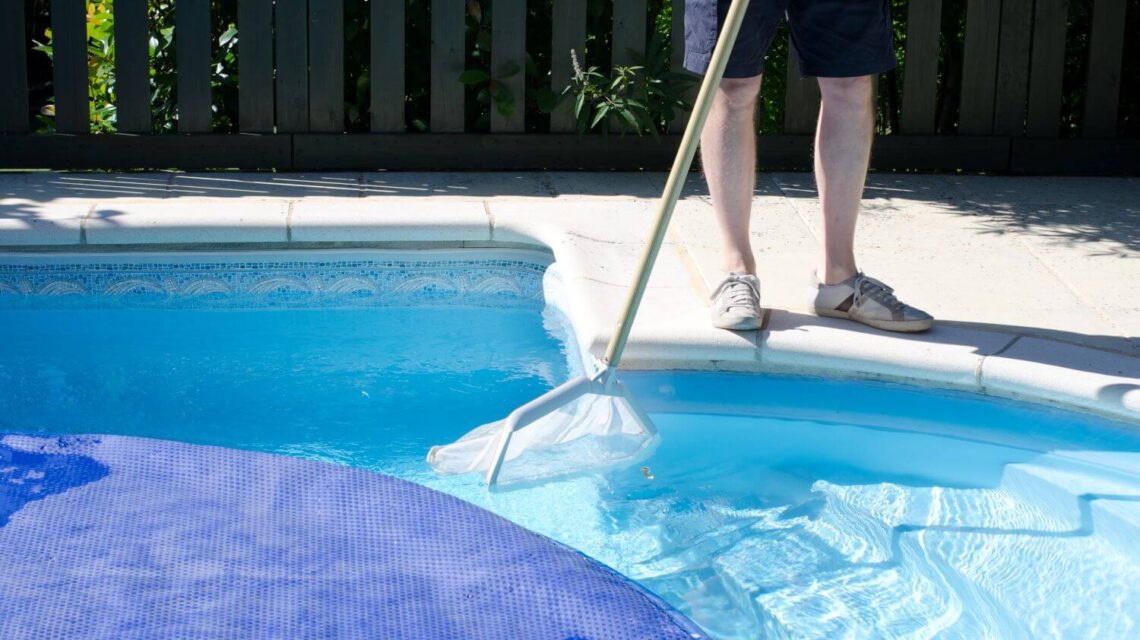Swimming pools are a great way to beat the heat and enjoy the outdoors all year round here in Florida. But, if not properly maintained, they can quickly become dirty and unsanitary. That’s why regular pool cleaning is so important.
In this article, we’ll provide a step-by-step guide to cleaning your pool and keeping it in top condition all season long.
Step 1: Skim the Surface for Debris
The first step in cleaning your pool is to skim the surface for debris. This includes leaves, bugs, and other small objects that may have fallen into the water. To do this, you’ll need a pool skimmer. Simply use the skimmer to collect any debris on the surface of the water and discard it in a trash can or compost bin.
Step 2: Brush the Walls and Tiles
Next, you’ll want to brush the walls and tiles of your pool to remove any dirt or grime that may have accumulated. This is important because it helps prevent algae growth and keeps your pool looking clean and clear. To do this, you’ll need a pool brush. Start at the top of the walls and work your way down, using a circular motion to scrub away any buildup. Don’t forget to brush the tiles as well.
Step 3: Vacuum the Pool
After skimming and brushing, it’s time to vacuum the pool. This will remove any dirt or debris that may have sunk to the bottom. There are several types of pool vacuums available, including manual and automatic options. If you’re using a manual vacuum, you’ll need to attach it to your pool’s filter system and move it around the bottom of the pool to pick up debris. If you’re using an automatic vacuum, simply turn it on and let it do the work for you.
Step 4: Check the pH Levels
Maintaining the proper pH balance in your pool is crucial to keeping it clean and sanitary. pH levels should be between 7.2 and 7.8 for optimal performance. Use a pool water testing kit to check the pH levels and adjust them as needed with the appropriate chemicals.
Step 5: Clean the Filter
Your pool’s filter is responsible for removing dirt, debris, and other contaminants from the water. Over time, the filter can become clogged and less effective. That’s why it’s important to clean it regularly. Check your filter’s manufacturer’s instructions for the recommended cleaning process.
Step 6: Learn to Shock the Pool
Shocking your pool involves adding a large amount of chlorine to the water to kill any bacteria or algae that may be present. This is typically done once a week to keep your pool clean and sanitary. Follow the instructions on your shock treatment product carefully.
Step 7: Maintain a Regular Cleaning Schedule
Finally, the key to keeping your pool in top condition is to maintain a regular cleaning schedule. This includes skimming the surface, brushing the walls, vacuuming the pool, checking the pH levels, cleaning the filter, and shocking the pool as needed. A regular cleaning schedule will ensure that your pool stays clean, clear, and enjoyable all season long.
In conclusion, cleaning your pool water may seem like a daunting task, but it’s actually quite simple when you learn to follow these seven easy care steps.
By skimming the surface, brushing the walls, vacuuming the pool, checking the pH levels, cleaning the filter, shocking the pool, and maintaining a regular cleaning schedule, you’ll be able to keep your pool in top condition and enjoy it all season long. So, grab your pool skimmer, brush, and vacuum, and get to work!
If all of this seems overwhelming, don’t worry – you don’t have to do it alone. Pool Services of Central Florida is here to help! Our experienced team of professionals can provide regular pool cleaning services to keep your pool in top condition all season long. Contact us today to learn more about our services and to schedule your first appointment. Let us handle the cleaning so you can focus on enjoying your pool!
If you have any questions please get in touch with Pool Services Of Central Florida today at Orlando: (407) 491-9487 | Tampa: (727) 286-8007 | Polk County: (863) 558-1881!




